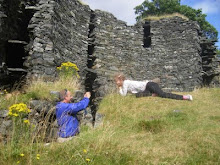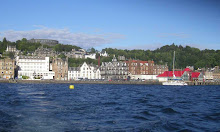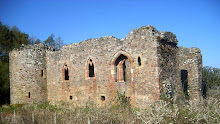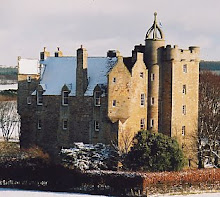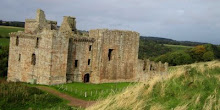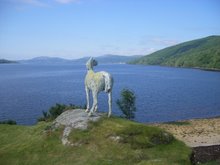
Clans (Gaelic
clann, children) provided the social fabric of the Scottish Highlands from medieval times until 1746. Central to this system, the roots of which lie in the Celtic tribes that confronted Julius Caesar, was that the clan chief held land,
duthcas, on behalf of his people. He was responsible for their security, wellbeing and the administration of justice. The clansmen (anyone living on the
duthcas) in turn owed unswerving loyalty to the chief. Clansmen felt no allegiance to the king of Scots or his lowland adherents,
sasannach.
The last Gaelic speaking king of Scotland died in 1513. Thereafter Gaelic became marginalised and the Highland clans developed separately from Lowland Scotland which housed the ruling elite. Apart from a different social structure and a different language, the Highland clans had a different dress (kilt), different music (bagpipes) and a different morality (the clan chief had an absolute duty to ensure the clan had food; if that meant stealing cattle then so be it). Clansmen raided regularly into Lowland Scotland and the Jacobite uprisings of the 18th century all had their roots in the Highlands. As with any minority aggressively asserting its own culture and threatening the status quo, the clans were resented, feared, despised. It was only in the 19th century under the influence of Queen Victoria's
'Balmorality' that Highland culture became not just accepted but highly fashionable.
In my
recent post on the last Cunningham Chief I referred to the 'Cunningham Family'. But the tombstone states 'Chief of Clan Cunningham'. So which is it?

When the Cunninghams arrived in Ayrshire south of Glasgow in the 12th century (along with the
Bruces, the Grahams and many others), they spoke English and it's unlikely any land-owning Cunningham ever spoke Gaelic, understood about
duthcas, or felt the least affinity with Gaelic culture. Their language became the rich Ayrshire Scots of Robert Burns. And the last Earl of Glencairn, who took holy orders in the Church of England, was certainly the most unlikely clan chief.
So runs the argument for the Cunninghams being a Lowland Family rather than a Highland Clan.
Sadly, since the death of the Earl of Glencairn in 1796, there has been no chief to provide guidance. There is also no Cunningham Association in the UK. There are two quarrelling Cunningham Associations in the USA; about the only thing that they agree on is that we are a clan not a family. Our American cousins actually take an active interest in preserving the Cunningham heritage; so who are we, who do nothing about it, to tell them what is right or wrong?
So 'Long Live Clan Cunningham!' and thank you Larry Augsbury, High Commissioner of the Clan Cunningham Society of America, for that fine memorial to our last clan chief!




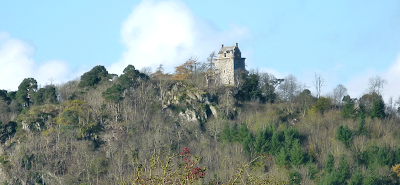















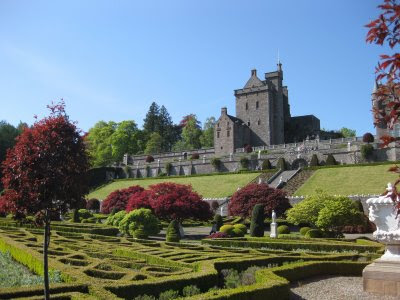 I was there two weeks ago. Looking out on the fine formal terraced gardens it was hard to imagine the despair of brave men contemplating defeat, attainder, life-long exile, the loss of everything that they couldn't carry with them.
I was there two weeks ago. Looking out on the fine formal terraced gardens it was hard to imagine the despair of brave men contemplating defeat, attainder, life-long exile, the loss of everything that they couldn't carry with them. 























 Finally, and a little whimsically, Gervaise de Rait was Edward I of England's man in Nairnshire. When Edward was strutting his stuff as the self-appointed 'Overlord of Scotland' in 1303, he spent ten days at Lochindorb Castle. During this period his army famously took Urquhart Castle, but also Nairn Castle. Rait lies on the road from Lochindorb to Nairn and it would be strange indeed if he didn't dine, or sleep, or both with his adherent at Rait!
Finally, and a little whimsically, Gervaise de Rait was Edward I of England's man in Nairnshire. When Edward was strutting his stuff as the self-appointed 'Overlord of Scotland' in 1303, he spent ten days at Lochindorb Castle. During this period his army famously took Urquhart Castle, but also Nairn Castle. Rait lies on the road from Lochindorb to Nairn and it would be strange indeed if he didn't dine, or sleep, or both with his adherent at Rait!














































